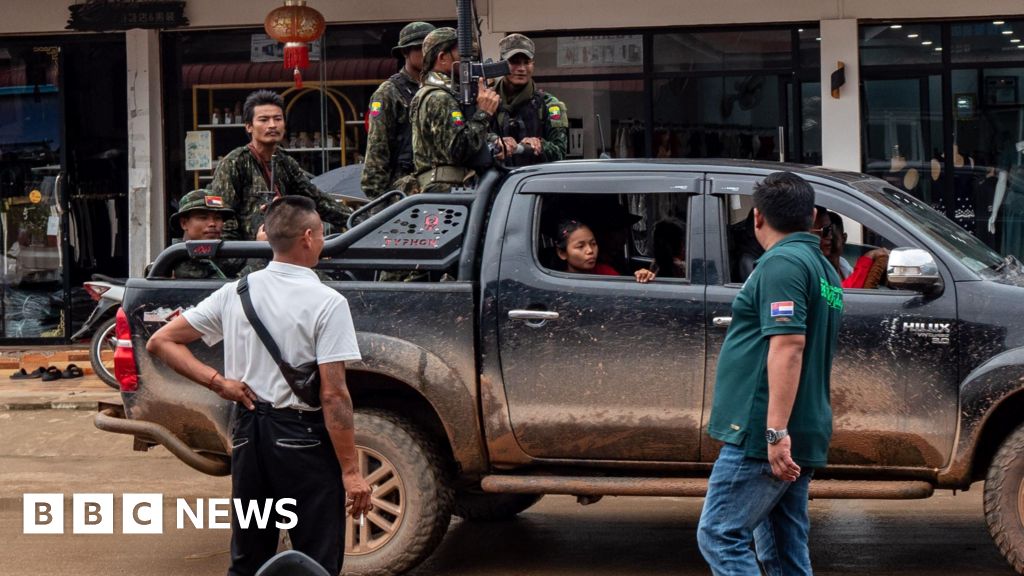The World Health Organization says it has only three days of fuel for its medical operations in southern Gaza, with shortages already forcing one of three remaining hospitals in the city of Rafah to shut down.
The Rafah border crossing with Egypt has been closed since Israel's military took control of the Palestinian side early Tuesday, blocking the entry of desperately needed humanitarian aid. The U.N. says northern Gaza is already in a state of “full-blown famine.”
Israel said it reopened Kerem Shalom crossing, the other main entry point for aid, on Wednesday. U.N. officials say no aid has entered Gaza, and there is no one to receive it on the Palestinian side because of ongoing fighting.
The war in Gaza has driven around 80% of the territory's population of 2.3 million from their homes and caused vast destruction to apartments, hospitals, mosques and schools across several cities. The death toll in Gaza has soared to more than 34,500 people, according to local health officials.
The war began Oct. 7 when Hamas attacked southern Israel, killing around 1,200 people, mostly civilians, and abducting about 250 others. Israel says militants still hold around 100 hostages and the remains of more than 30 others.
Currently:
— Yemen's Houthi rebels claim 2 attacks in Gulf of Aden
— Palestinians flee chaos and panic in Rafah after Israel’s seizure of border crossing
— Biden says US won’t supply weapons for Israel to attack Rafah, in warning to ally
— Why the U.S. paused the delivery of 2,000-pound bombs to Israel ahead of a possible Rafah attack
— Israel says it reopened a key Gaza crossing after a rocket attack. The U.N. says no aid has entered.
— Has Israel followed the law in its war in Gaza? The U.S. is due to render a first-of-its-kind verdict.
Follow AP’s coverage of the war at https://apnews.com/hub/israel-hamas-war
Here's the latest:
TEL AVIV — Far-right Israeli National Security Minister Itamar Ben Gvir posted “Hamas loves Biden” on X, formerly called Twitter, a day after U.S. President Joe Biden said he would not supply offensive weapons that Israel could use to launch an all-out assault on Rafah.
Biden, in an interview with CNN on Wednesday, said the U.S. was still committed to Israel’s defense and would supply Iron Dome rocket interceptors and other defensive arms, but that if Israel goes into Rafah, “we’re not going to supply the weapons and artillery shells used.” There is widespread concern over the well-being of the more than 1 million civilians sheltering in Rafah.
Ben Gvir, who used a heart emoji in his tweet regarding Biden and Hamas, has pushed for a punishing military response and has threatened to leave the government if Israel does not carry out a wide-ranging military operation in Rafah. “Hamas’ exercises and games have only one answer: an immediate order to occupy Rafah!” he wrote on X on Monday.
CAIRO — An Israeli airstrike on a residential building killed eight people including four children late Wednesday, according to hospital records. The strike hit a residential building in Tel al-Sultan in western Rafah.
Israel’s military took control of the Palestinian side of the Rafah crossing early Tuesday after issuing evacuation orders for eastern parts of the city, home to some 100,000. It then sent tanks to seize the nearby Rafah crossing with Egypt, shutting it down.
Associated Press journalists heard sporadic explosions and gunfire in the area of the Rafah crossing overnight Tuesday, including two large blasts early Wednesday.
On Wednesday afternoon, hospital records showed at least 25 people were wounded when Israeli artillery fire struck part of central Rafah, an area that Israel did not tell Palestinians to evacuate ahead of its operation. The military had no immediate comment.
TEL AVIV — An Israeli soldier was killed by a mortar launched from Lebanon, as tensions between Israel and Lebanon continue to rise during the war in Gaza. The soldier was killed on Wednesday and the army announced the death on Thursday. It was the third fatality in a week in Israel on the northern border from launches from Lebanon.
The Israeli army said fighter jets struck Hezbollah military structures in southern Lebanon on Wednesday in response. Defense Minister Yoav Gallant also toured Israel’s northern border on Wednesday and warned that a war with Hezbollah would have “a heavy cost for Israel and a catastrophic one for Hezbollah and Lebanon.” He added that while Israel was open to a diplomatic solution on the northern border, the army was also preparing for a possible military operation to allow citizens to return to their homes. Tens of thousands of civilians have been evacuated from Israel and southern Lebanon since the war began.
A total of 15 soldiers and 10 civilians have been killed in Israel by Lebanese launches. In Lebanon, more than 370 people have been killed by Israeli strikes, including more than 70 civilians and non-combatants.
DAMASCUS, Syria — Syrian state media say an Israeli strike on a building in a suburb of the capital, Damascus, caused damage but no casualties.
State news agency SANA cited a military official as saying that Syrian air defenses shot down some of the Israeli missiles before they reached their targets early Thursday.
The Britain-based Syrian Observatory for Human Rights, an opposition war monitor, said the strike targeted Iran-backed fighters in the southern Damascus suburb of Sayida Zeinab. It did not report any casualties.
There was no comment from Israel’s military on the strike. Israel rarely acknowledges such strikes, although it has carried hundreds over the past years, mainly targeting Iran-backed fighters such as Lebanon’s Hezbollah group.
The strike was the second on Syria since an April 1 attack blamed on Israel struck the Iranian Consulate in Damascus, killing seven people, including two Iranian generals.
Iran responded days later by launching hundreds of missiles and drones at Israel. Most were shot down, Israel said.
Yemen’s Houthi rebels on Thursday claimed two missile attacks in the Gulf of Aden on two Panama-flagged container ships that caused no damage, while also saying they targeted a ship in the Indian Ocean in a previously unreported assault.
The claims by Brig. Gen. Yahya Saree come as the tempo of the rebel attacks have waned in recent weeks as they’ve been targeted by repeated airstrikes launched by a U.S.-led coalition warship in waterways crucial to international trade. The Houthis insist their assaults will continue as long as Israel’s war on Hamas in the Gaza Strip goes on.
Saree in a prerecorded statement claimed attacks on the MSC Diego and MSC Gina. The Joint Maritime Information Center, a U.S.-led coalition of nations operating in the Mideast, said those two missile attacks happened early Tuesday.
President Joe Biden said Wednesday that he would not supply offensive weapons that Israel could use to launch an all-out assault on Rafah — the last major Hamas stronghold in Gaza — over concern for the well-being of the more than 1 million civilians sheltering there.
Biden, in an interview with CNN, said the U.S. was still committed to Israel’s defense and would supply Iron Dome rocket interceptors and other defensive arms, but that if Israel goes into Rafah, “we’re not going to supply the weapons and artillery shells used, that have been used.”
The interview marked Biden’s toughest public comments yet about the potential Israeli military operation and followed his decision to pause a shipment of heavy bombs to Israel last week over concerns that the U.S. ally was moving closer to an attack on Rafah despite public and private warnings from his administration.
UNITED NATIONS — The United Nations is engaged in intensive discussions with Israeli and Egyptian authorities to restart fuel shipments to Gaza as soon as possible in order keep providing humanitarian operations.
U.N. humanitarian staff in Gaza are rationing fuel to stretch what’s available for as long as possible, “but it is clear that it is a matter of hours, if not days, where we will have no more fuel,” U.N. spokesman Stephane Dujarric told reporters Wednesday
Between May 1 and May 5, a daily average of 48 trucks carrying more than 160,000 liters of fuel entered Gaza through the now-closed Rafah crossing with Egypt, Dujarric said.
The U.N. spokesman confirmed that nothing has entered Gaza from the Kerem Shalom crossing, which Israel said it reopened Wednesday, because fighting is still ongoing. With rockets falling and other military activities, there is an issue of safety of humanitarian personnel, he said.
JERUSALEM — Dozens of bodies were buried in a mass grave on the grounds of Shifa hospital in northern Gaza, where Israeli forces staged two major operations during the war, the Health Ministry in Gaza said Wednesday.
It is unclear who was buried in the grave or how they died. The Health Ministry says it was the third mass grave found at Shifa since the war began. A two-week Israeli raid in March left Gaza's largest medical complex in ruins.
Mass graves have also been uncovered at other hospitals Israel raided. In some cases hospital officials said they had been dug purposely to bury the dead until it was safe to move the bodies to a final resting place.
Israel says it has nothing to do with the mass graves, claiming the people buried there either died in battle or were patients who died in the hospital. The United Nations has called for “a clear, transparent and credible investigation” of the mass graves.
WASHINGTON -- A U.S. official says that CIA Director William Burns is in Israel as international mediators push for a cease-fire.
The official said Burns arrived on Wednesday and was meeting with Israeli Prime Minister Benjamin Netanyahu. The official spoke on condition of anonymity to discuss closed-door negotiations.
The official gave no details on the discussions. But Burns has been in the region meeting with Egyptian and Qatari officials in recent days. He had been scheduled to travel to Israel from Qatar earlier this week, but that meeting was postponed without explanation.
All three countries have been involved in months of talks aimed at halting the seven-month war between Israel and Hamas.
Hamas announced on Sunday that it had accepted an Egyptian-Qatari cease-fire plan. But Israel says the proposal does not meet its “core” demands.
— By ELLEN KNICKMEYER

 8 months ago
35
8 months ago
35









